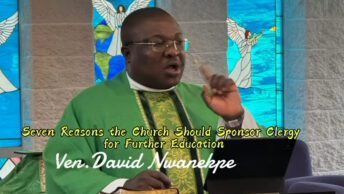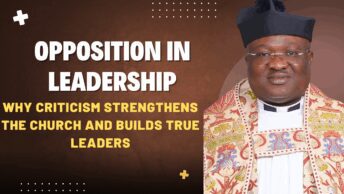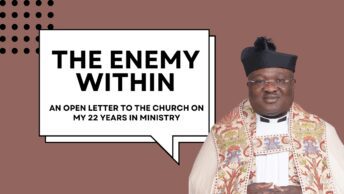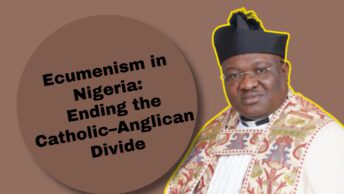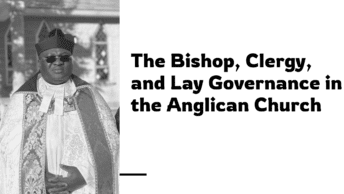By Ven. David Chimezie Nwanekpe
Rector, Anglican Church of the Holy Spirit, Bronx, NY
Chaplain, Council of Knights (CONNAM)
It is no longer an empty threat. It truly looks as if the Anglican family might be facing its biggest division yet perhaps a real break right down the middle in March 2026. A lot is happening in our Communion, and I want to explain it as simply and honestly as I can.
The Roots of Anglicanism
The word Anglican comes from the old Latin word Anglicanus, which means English. So the Anglicana Ecclesia was the Church of England. But when England built its empire, the church went with it. That is why today we have Anglican churches in many countries the Church of Nigeria, the Anglican Church of Kenya, the Church of Uganda, the Anglican Church of Australia, the Episcopal Church in the United States, and many others.
Each of these churches has its own leader a primate, presiding bishop, or archbishop and is not controlled by any other bishop. Yet they remain linked through what we call the Anglican Communion, a global family bound by shared faith, liturgy, and heritage.
Divisions That Never Fully Healed
Unity in the Communion has long been tested. In the 1970s, when some churches began ordaining women as priests, others protested and broke away. They called themselves Continuing Anglicans.
Later, when the Episcopal Church and the Anglican Church of Canada accepted same-sex marriage and non-celibate gay clergy, new groups like the Anglican Church in North America (ACNA) formed, claiming to preserve traditional Anglican doctrine.
Even within the Communion, the differences remain sharp. Some provinces have ordained women for over fifty years and allow same-sex marriage; others allow neither. The Church of England the historic mother church is caught in the middle, trying to maintain peace between the liberal West and the conservative Global South.
The Welby Years and the Rise of GAFCON
From 2013 until his resignation in 2025, Archbishop Justin Welby tried to hold this fragile balance together. But following an abuse scandal and approaching retirement age, he stepped down.
During his time, a parallel movement had already formed GAFCON, the Global Fellowship of Confessing Anglicans. Founded in 2008 in Jerusalem, GAFCON brought together archbishops from Nigeria, Uganda, Kenya, Rwanda, South Sudan, the Congo, and other provinces, all united by a commitment to biblical orthodoxy.
Some GAFCON members still belong to the official Anglican Communion, while others,such as ACNA, the Reformed Evangelical Anglican Church of South Africa, and the Anglican Church in Brazil,exist outside it. Together, they now represent the majority of Anglicans worldwide.
Another network, the Global South Fellowship of Anglican Churches (GSFA), also shares this vision. In 2023, it declared that it no longer recognized the Archbishop of Canterbury as first among equals, accusing the Church of England of abandoning biblical faith.
2025: The Breaking Point
The sense of crisis deepened in July 2025, when Cherry Vann became Archbishop of the Church in Wales,the first woman and first openly LGBTQ+ person to serve as an Anglican archbishop. The Church of Nigeria immediately cut ties with Wales in protest.
Soon after, the Church of England appointed Dame Sarah Mullally, Bishop of London, as the next Archbishop of Canterbury,the first woman ever to hold the position, and the first to openly identify as pro-choice.
On October 3, 2025, Archbishop Laurent Mbanda, GAFCON’s Chairman, issued a strong statement titled “Canterbury Appointment Abandons Anglicans.” He wrote that the Church of England had “chosen a leader who will further divide an already broken Communion,” and that the office of Canterbury “can no longer serve as a credible focus of unity.”
He also accused Archbishop Mullally of breaking her consecration vows and of supporting “revisionist teachings” on sexuality and marriage. He concluded:
“The Church cannot bless or affirm what God has condemned. Since Canterbury has relinquished that duty, leadership must now pass to those who uphold the authority of Scripture. The reset of our beloved Communion is now in the hands of GAFCON.”
March 2026: A Defining Moment
With that, GAFCON called for a Bishops’ Assembly to be held in Abuja, Nigeria, from March 3–6, 2026 described as the most significant gathering of faithful Anglicans since 2008.
Many see this as the possible moment of final separation when two global Anglican communions could officially emerge:
- One led from Canterbury, centered in the historic Church of England.
- The other led by GAFCON, grounded in the Global South and claiming faithfulness to biblical Anglicanism.
Even if the split is delayed, the direction is unmistakable. Archbishop Mullally, now 63, will likely serve less than a decade. Her appointment has been warmly welcomed by liberal provinces like the Episcopal Church in the United States, whose Presiding Bishop, Sean Rowe, praised her as:
“A wise and steady leader, a faithful advocate for women in ministry, and a bishop committed to protecting the vulnerable.”
Conclusion
So here we stand,the Anglican Communion, once known for its balance of Scripture, reason, and tradition, now stretched to its limit. The Abuja meeting in March 2026 may decide whether we remain one family or become two.
Whatever happens, history will remember this period as the time when Anglicanism faced its greatest test and perhaps chose its true identity once again.
©️ 2025 Ven. David Chimezie Nwanekpe
Rector, Anglican Church of the Holy Spirit, Bronx, New York



